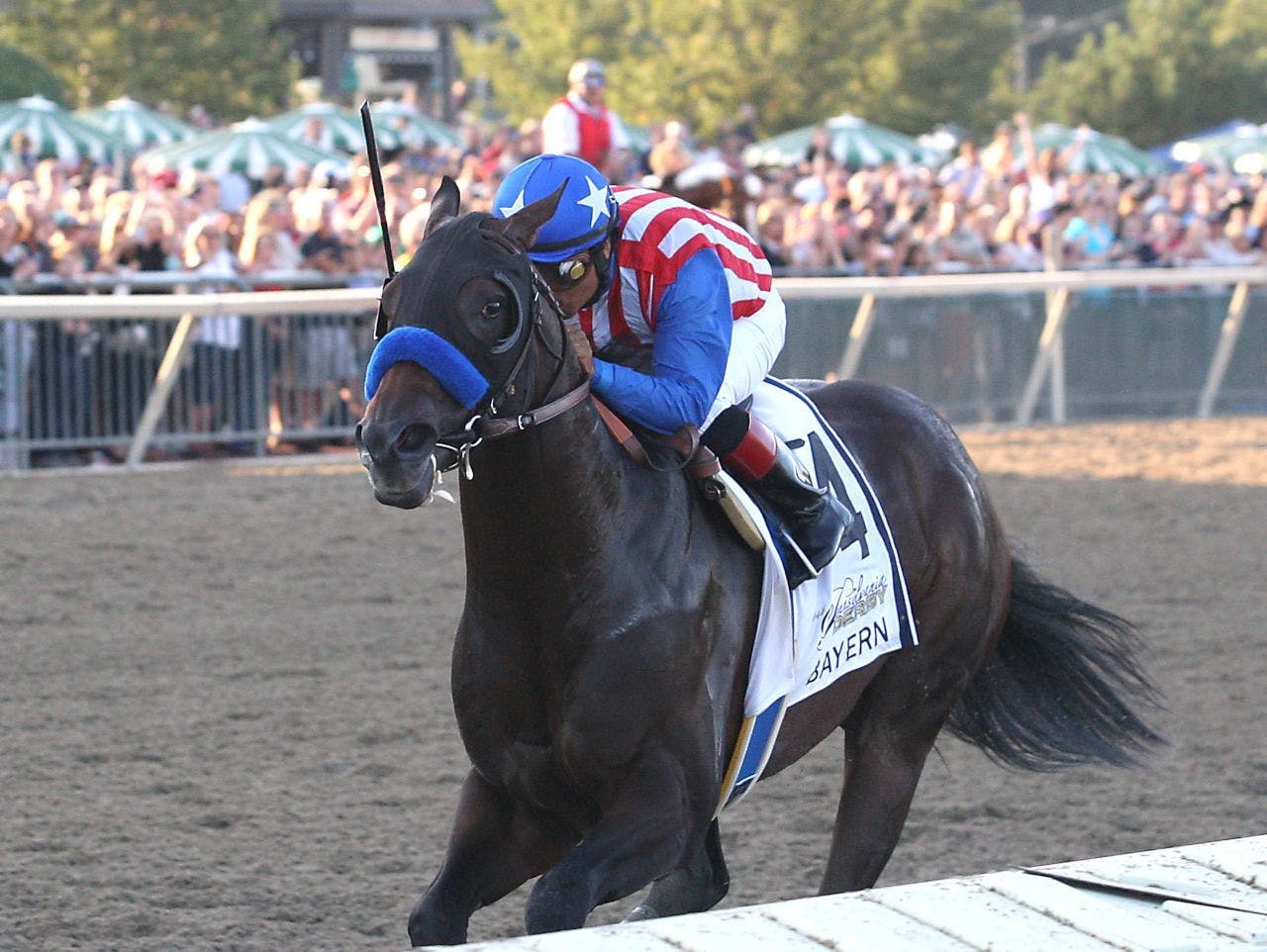Pennsylvania Derby: By The Numbers

Bayern, the Pennsylvania Derby recordholder, is its only winner to add the Breeders' Cup Classic (Bill Denver/Equi-Photo)
The Pennsylvania Derby (G1) has become the richest fall target exclusively for classic-distance three-year-olds. Here is a look at the Keystone State’s big race by the numbers.
1:46.96
The fastest time recorded in the Pennsylvania Derby. It was recorded by Bayern when he led all the way to beat a very good field, which included California Chrome and Tapiture, by 5 3/4 lengths. The time, a track record for 1 1/8 miles at Parx, was a good indicator of Bayern’s class; six weeks later, he would beat the best horses in America in somewhat controversial fashion in the Breeders’ Cup Classic (G1).
3
The most wins by any trainer in the Pennsylvania Derby. It’s held by three trainers, all Hall of Fame inductees. Woody Stephens won the first Pennsylvania Derby in 1979 with Smarten and won again with Morning Bob (1984) and Cefis (1987).
Nick Zito was the next to score three victories, with Sun King (2005), Anak Nakal (2008), and Morning Line (2010); they have since been emulated by Bob Baffert, who won with Bayern (2014), West Coast (2017), and McKinzie (2018). Baffert would potentially have sought a fourth victory this year with Medina Spirit, but has since withdrawn the horse due to a wide gate.
4
The number of renewals of the Pennsylvania Derby that will have been Grade 1 contests once the 2021 running is completed. The race was promoted to Grade 3 status for its third running in 1981, and to Grade 2 level in 1983. It was relegated back to Grade 3 in 1996 and didn’t become a Grade 2 event again until 2004.
The path to Grade 1 status began in 2010, when it was moved from Labor Day weekend to late September, providing more separation from the Travers S. (G1) and making it an attractive lead-up for three-year-olds to the Breeders’ Cup Classic. It became a Grade 1 in 2017, but this will only be the fourth top-level renewal of the race as it was not staged last year due to Covid-19.
6
The number of times the Pennsylvania Derby was run in spring. When first staged, the Pennsylvania Derby was on Memorial Day weekend, sandwiched between the Preakness S. (G1) and Belmont S. (G1).
One of its spring winners, 1981 victor Summing, would spring a 7-1 surprise 12 days later when winning the Belmont, disappointing a big crowd who hoped to see eventual third-place finisher Pleasant Colony take out the Triple Crown. The Pennsylvania Derby was switched to fall in 1985.
15
The number of Pennsylvania Derby winners to go on and contest the Breeders’ Cup Classic later that year. Until 2009, when the race was run in early September, only seven winners started in the end-of-season championship, with Macho Uno getting closest when finishing fourth in 2001.
But since the race moved to the last weekend in September in 2010, eight of the 10 winners have contested the Classic, usually six weeks later. Bayern is the only winner, but Will Take Charge (2013) was a close second, and West Coast (2017) finished third.
Connect (2016) and Morning Line (2010) are the only Pennsylvania Derby winners since the race was moved that missed the Classic, though Morning Line ran in the Breeders’ Cup Dirt Mile (G1) instead, finishing second.
17
The number of lengths that Western Playboy beat his rivals by in the 1989 Pennsylvania Derby, which is still the record margin of victory for the race. Western Playboy has a niche in history as the first Illinois-bred galloper to earn $1 million; in addition to the Pennsylvania Derby, he won the Blue Grass S. (G1) and Jim Beam S. (G2) and was placed in the Florida Derby (G1), Arlington Classic (G1), and Donn H. (G1). He was unfortunate enough to be part of the three-year-old crop that included Sunday Silence and Easy Goer, finishing seventh behind that pair in the 1989 Breeders’ Cup Classic.
1979
The year of the first Pennsylvania Derby. It was won by Smarten, a very good three-year-old who went on a roll in summer and won six consecutive stakes races: the Woodlawn S. (G3), Illinois Derby (G3), Pennsylvania Derby, Ohio Derby (G2), American Derby (G2), and Marylander H. Trainer Woody Stephens wisely kept Smarten away from the season’s best sophomore, Spectacular Bid; the only time they raced was the Meadowlands Cup (G2), in which Smarten finished second.
1,250,000
The record purse in dollars for the Pennsylvania Derby. The race hit the $1 million mark in 2007 and has remained at that value every year with the exception of 2016, when it was upped to $1.25 million due to the presence of two Triple Crown race winners, Kentucky Derby (G1) winner Nyquist and Preakness winner Exaggerator. It was a race to forget for both; the pair finished sixth and seventh, respectively, and neither would grace a racetrack again. The race was won by Connect from future Horse of the Year Gun Runner.
ADVERTISEMENT



